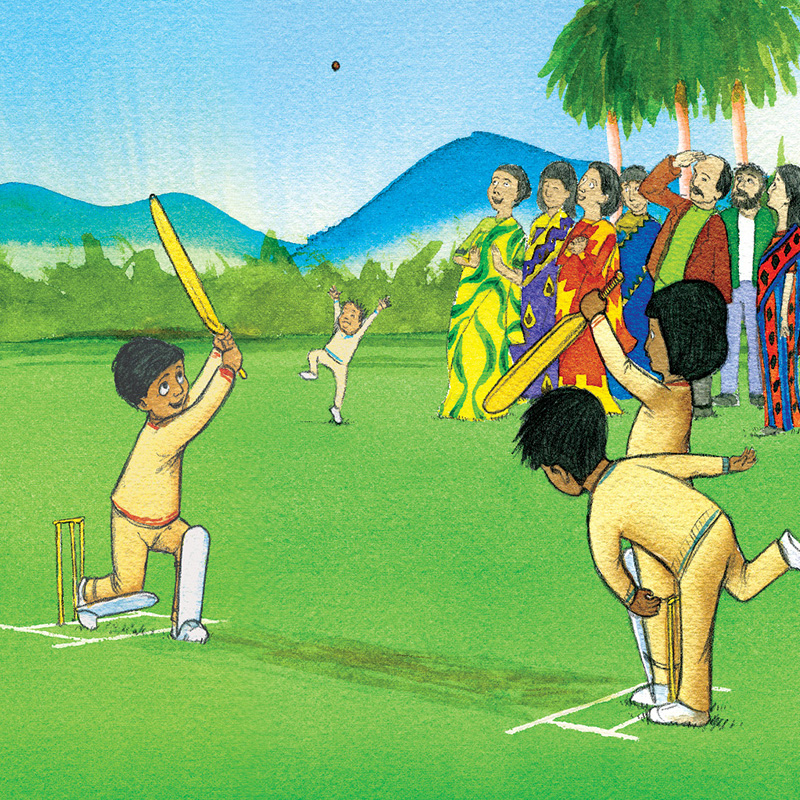"I was bowled over, completely!" How we use sayings from sport in our everyday conversation
We’ve seen a lot of sports coverage this summer – Wimbledon, the FIFA Women's World Cup, the Cricket World Cup (amazingly, England won that one…) It got us thinking about all those sporting terms and phrases that have made their way into our more-or-less everyday conversations.
Sticking with cricket, we know something is unacceptable if we hear “it’s just not cricket”, while if you’re on a “sticky wicket”, it’s not good news. Meanwhile, if you’re “bowled over” by something or someone, we can rest assured that you’re pretty impressed.
Sport in general gives us lots of terms as well: we call someone a “good sport” if they are happy to join in with community events or the school play for example, and if we’re not sure if someone might be suitable we can give them a “sporting chance”.
Any game where there’s a ball involved has added expressions to the language. If the rules on something have changed, we might talk about “moving the goalposts” or “a whole new ballgame”.
On the subject of games, you might hear that it’s a “game of two halves”, usually applied to football, but to other situations as well. It usually means that the way a team has been playing or behaving initially is very different to the way they might play or behave after a break. “Game, set and match”, usually applied to tennis, can also be used if someone has had a victory in other areas of life, and if we’re arranging a secret party, we know we need to be careful not to “give the game away”.
If you’re being expected to improve something you might “raise your game”, and if a deadline is approaching, we talk about “late in the game”. If you’re happy to try something out, we can use “I’m game”.
It isn’t only land sports that have become part of everyday speech, either. If things are going “swimmingly” you know everything is fine, while if things are getting on top of you, you can say you’re “just about keeping your head above water” or you’re “drowning in” paperwork, for instance. Should you ever find yourself in a situation where you haven’t been given much support, you can also say you’ve been “thrown in at the deep end”.
If you need to try something out, like a new route to school, you can use “dummy run”, and “kickoff” can simply mean the start. And even if baseball isn’t played much where you are, we all know that the “home run” means we’re nearing the end of something, usually after a long and arduous journey to get there. (Not unlike the 2019 Cricket World Cup....!)
References
Wood, R. (2008), List of Sports - Every sport from around the world, Topend Sports Website, https://www.topendsports.com/sport/list/index.htm (accessed 16 July 2019)
Sticking with cricket, we know something is unacceptable if we hear “it’s just not cricket”, while if you’re on a “sticky wicket”, it’s not good news. Meanwhile, if you’re “bowled over” by something or someone, we can rest assured that you’re pretty impressed.
Sport in general gives us lots of terms as well: we call someone a “good sport” if they are happy to join in with community events or the school play for example, and if we’re not sure if someone might be suitable we can give them a “sporting chance”.
Any game where there’s a ball involved has added expressions to the language. If the rules on something have changed, we might talk about “moving the goalposts” or “a whole new ballgame”.
On the subject of games, you might hear that it’s a “game of two halves”, usually applied to football, but to other situations as well. It usually means that the way a team has been playing or behaving initially is very different to the way they might play or behave after a break. “Game, set and match”, usually applied to tennis, can also be used if someone has had a victory in other areas of life, and if we’re arranging a secret party, we know we need to be careful not to “give the game away”.
If you’re being expected to improve something you might “raise your game”, and if a deadline is approaching, we talk about “late in the game”. If you’re happy to try something out, we can use “I’m game”.
It isn’t only land sports that have become part of everyday speech, either. If things are going “swimmingly” you know everything is fine, while if things are getting on top of you, you can say you’re “just about keeping your head above water” or you’re “drowning in” paperwork, for instance. Should you ever find yourself in a situation where you haven’t been given much support, you can also say you’ve been “thrown in at the deep end”.
If you need to try something out, like a new route to school, you can use “dummy run”, and “kickoff” can simply mean the start. And even if baseball isn’t played much where you are, we all know that the “home run” means we’re nearing the end of something, usually after a long and arduous journey to get there. (Not unlike the 2019 Cricket World Cup....!)
References
Wood, R. (2008), List of Sports - Every sport from around the world, Topend Sports Website, https://www.topendsports.com/sport/list/index.htm (accessed 16 July 2019)
Related Posts
-
In the Land of the Northern Lights
-
Celebrating Refugee Week
-
Wild March winds and gentle April showers eventually help May flowers to grow in our gardens, so where are the bees and butterflies?
-
Dual Language Story Books - Welcome, Bienvenu, Come on In
-
Language – so much more than just the spoken word
-
Look Before You Leap – And What Have Silk Gloves Got To Do With Leap Years?
-
Spotlight on Dari
-
EAL: The home language as a practical strength
-
When is a fruit not a fruit? When it’s a tomato…which is also a vegetable...
-
Sing something simple – using songs for language learning












